

On OER – Beyond Definitions. I’ve yet to publish anything from my time spent in the UK as an OLNet Fellow.
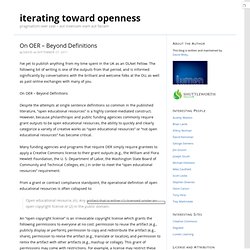
The following bit of writing is one of the outputs from that period, and is informed significantly by conversations with the brilliant and welcome folks at the OU, as well as past online exchanges with many of you. On OER – Beyond Definitions Despite the attempts at single sentence definitions so common in the published literature, “open educational resources” is a highly context-mediated construct. However, because philanthropic and public funding agencies commonly require grant outputs to be open educational resources, the ability to quickly and clearly categorize a variety of creative works as “open educational resources” or “not open educational resources” has become critical.
Many funding agencies and programs that require OER simply require grantees to apply a Creative Commons license to their grant outputs (e.g., the William and Flora Hewlett Foundation, the U. Open educational resource, (n). Is the OER movement flawed? Join the debate! Open Educational Resources (OER) are a very popular issue at eLearning Africa.
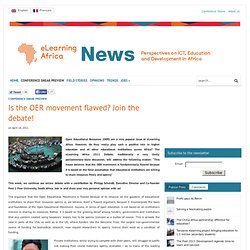
However, do they really play such a positive role in higher education and at other educational institutions across Africa? The eLearning Africa 2011 Debate, traditionally a very lively, parliamentary-style discussion, will address the following motion: “This house believes that the OER movement is fundamentally flawed because it is based on the false assumption that educational institutions are willing to share resources freely and openly.” This week, we continue our online debate with a contribution by Philipp Schmidt, Executive Director and Co-founder Peer 2 Peer University, South Africa.
Join in and share your very personal opinion with us! Philipp Schmidt This is a contribution by Neil Butcher, OER Africa strategist, arguing against the motion. Rethinking the O in OER : Information Environment Team. Being immersed in the UK open educational resources (OER) programme it can be hard to step outside the programme boundaries and look at it with fresh eyes.
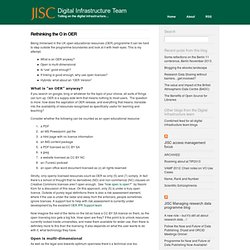
This is my attempt. What is an OER anyway? Open is multi-dimensionalIs “use” good enough? OER Hack Day. The OER Hack Day event was jointly organised by JISC CETIS and DevCSI.
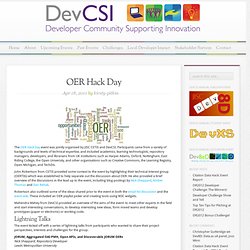
Participants came from a variety of backgrounds and levels of technical expertise, and included academics, learning technologists, repository managers, developers, and librarians from UK institutions such as Harper Adams, Oxford, Nottingham, East Riding College, the Open University, and other organisations such as Creative Commons, the Learning Registry, Open Michigan, and TechDis. John Robertson from CETIS provided some context to the event by highlighting their technical interest group (OERTIG) which was established to help separate out the discussion about OER.
He also provided a brief overview of the discussions in the lead up to the event, including blog postings by Nick Sheppard, Amber Thomas and Dan Rehak. Rethinking the O in OER : Information Environment Team. Branding, repositories, OER and awareness raising: some thoughts on embedding OERs - Higher Education Academy Subject Centre for Medicine, Dentistry and Veterinary Medicine (MEDEV)
First of all I want to say thank you for such a stimulating exchange on Twitter a couple of days ago with OER and repository colleagues, this post is partly based on that exchange and they deserve publicly thanking: David Kernohan (@dkernohan), Pat Lockley (@patlockley), John Robertson (@kavubob) and Nick Sheppard (@mrnick).
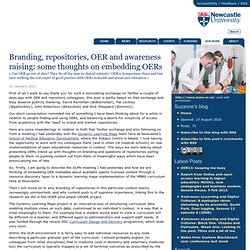
Our short conversation reminded me of something I have been thinking about for a while in relation to people finding and using OERs, and balancing a desire for simplicity of access from academics with the 'need' to brand and market repositories. Here are some meanderings in relation to both that Twitter exchange and also following on from a meeting I had yesterday with the Dynamic Learning Maps team here at Newcastle’s School of Medical Education Development, where the Subject Centre is based.
What I didn’t see at the Open Education Conference – using negative space to outline the future of OER « Paul Stacey. What I didn’t see at the Open Education Conference – using negative space to outline the future of OER My participation in the recent Open Education Conference in Barcelona and follow on readings of posts like that of Scott Leslie and Brian Lamb and the numerous papers from presenters now available at the Universitat Oberta de Catalunya’s institutional repository have led me to engage in a lot of deeper thinking about the whole field of Open Education Resources (OER).
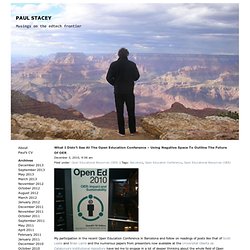
It wasn’t so much that the conference was a stellar event full of stimulating innovative sessions. To be frank it wasn’t. But sometimes it’s the things that aren’t there that make you see whats missing and think more deeply. I have an interest in art and when I was learning to draw we were encouraged to see negative space. The Role of Open Educational Resources in Personal Learning. [All Presentations] The Role of Open Educational Resources in Personal Learning March 29, 2011 Keynote presentation delivered to Best Practices in Upgrading Online, Calgary, via Adobe Connect.
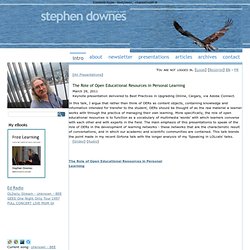
In this talk, I argue that rather than think of OERs as content objects, containing knowledge and information intended for transfer to the student, OERs should be thought of as the raw material a learner works with through the practice of managing their own learning. The OER Debate, In Full. Over the last couple of weeks I participated in a debate on whether OER projects should favour commercial use.
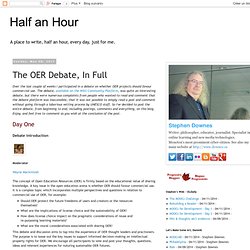
The debate, available on the WSIS Community Platform, was quite an interesting debate, but there were numerous complaints from people who wanted to read and comment that the debate platform was inaccessible, that it was not possible to simply read a post and comment without going through a laborious vetting process by UNESCO staff. So I've decided to post the entire debate, from beginning to end, including postings, comments and everything, on this blog. Enjoy, and feel free to comment as you wish at the conclusion of the post. Day One Debate introduction. OER Funding: Technical mini projects and Literature Review : Information Environment Team. There is funding available for two areas relating to open educational resources.
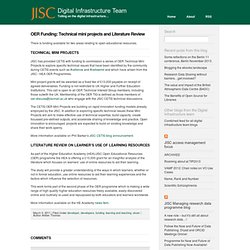
Technical mini projects JISC has provided CETIS with funding to commission a series of OER Technical Mini Projects to explore specific technical issues that have been identified by the community during CETIS events such as #cetisrow and #cetiswmd and which have arisen from the JISC / HEA OER Programmes. Mini project grants will be awarded as a fixed fee of £10,000 payable on receipt of agreed deliverables.
Funding is not restricted to UK Higher and Further Education Institutions. Learning as we go : SPACE. OER Workshop. Last week we ran our first workshop exploring OER use with 9 academics across a variety of institutions.
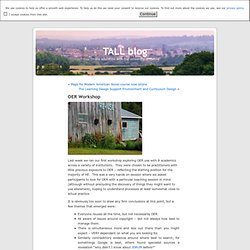
They were chosen to be practitioners with little previous exposure to OER – reflecting the starting position for the majority of HE. This was a very hands on session where we asked participants to look for OER with a particular teaching session in mind (although without precluding the discovery of things they might want to use elsewhere), hoping to understand processes at least somewhat close to actual practice. It is obviously too soon to draw any firm conclusions at this point, but a few themes that emerged were: Everyone reuses all the time, but not necessarily OER. A reflection on the OER debate: Every Which Way but Loose. Don’t call it OER. Call it Creative Commons. OER: The Myth of Commercial Textbook Reliability.
Image via WikipediaAn "OER" is an open education resource and the most common example is an open textbook. An open textbook is a book, most often electronic, that is licensed in a way that allows re-use, repurposing, editing, and republishing. One of the main advantages in an open textbook, apart from the fact that they are free, is that open textbooks can be edited by the instructor. Some "open" textbooks managed by commercial publishers may not be editable at the sentence level. . Evolution of an OER Initiative – An Eight Year Retrospective « Paul Stacey. Making the most of open content: understanding use (Part II) : Information Environment Team. A defence of the OER movement: Any Which Way You Can. What’s the (re)use of OER? What’s the (re)use of OER? March 11th, 2011 at 03:03 Back in 2006, I recall Professor Chris Ennew asking if I’d ever heard of MIT’s Open Courseware initiative. OERs shining light, new textbook model, or harbinger of a new im. Ok. So I’ve been backchanneling all over the place trying to get my mind around what I’ve been trying to get my mind around this week (really… for the past year).
I have a couple of questions that I’d like to explore… What are OERs good for? When are they a good thing? Could they be a bad thing? Misunderstanding capitalism and OER « Expedient Means. David Wiley has just posted about Openness, Socialism and Capitalism. Comments are turned off on his blog, so I thought I’d reply here. Openness, Socialism, and Capitalism « iterating toward openness. I frequently hear people attempt to equate the open education movement with socialism. After all, the logic goes, what could possibly be more socialist than freely sharing things with everyone? Why Bother Being Open? « iterating toward openness. Is an OER still an OER if no-one uses it? - The Followers of the Apocalypse (dkernohan's posterous)
OERs, capitalism and social totality. In his post on Openness, Socialism, and Capitalism , David Wiley argues for the reform of a particular form of capitalism within education that should enable taxpayers to recover the value of OER-as-commodity, in the same way that they would receive the value of any other commodity in a functioning market.
It turns out that students do use OER and it does save time. Some downside to OER? As part of my non-CETIS work I occasionally go out to evaluate teaching practice in Engineering for the HE Academy Engineering Subject Centre. OERs: the good, the bad and the ugly.